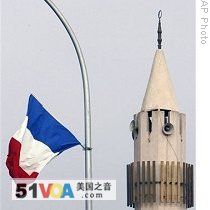Paris
13 May 2009
Islam is Europe's second largest religion. But in recent years, some members of Europe's 20 million strong Muslim community have met strong resistance as they seek to build mosques and minarets, the basic tangible foundation of their faith.
 |
| A French flag flies in front of a mosque in Riyadh, Saudi Arabia marking the visit of French President Nicolas Sarkozy (File) |
A slice of this diversity can be seen in Montreuil's 12,000-strong Muslim community. Its members, who hail from North and sub-Saharan Africa, represent about 20 percent of the town's population.
Mohammed Abdoulbaki is vice-president of the Cultural Federation of Muslims of Montreuil, an umbrella group formed to build a central mosque for the city. He shows a visitor the building site for the future, $2.7 million prayer hall, which is now little more than a dusty patch of weeds and litter.
But construction is finally set to begin this fall, ending a years' long fight to build a main mosque for Montreuil. In 2003, a city hall councillor from a right-wing political party filed a legal complaint arguing that a city lease for the site, for a token amount of about $1.30, violated France's 1905 law separating church and state.
Only last year did an appeals court allow building to go ahead. Mohammed Abdoulbaki.
Abdoulbaki says many Muslims were afraid of investing in the mosque because they had heard about the court case. Now, he said, the community has raised about a quarter of the building costs.
Like Muslims elsewhere in Europe, those in Montreuil's have been packed into tiny, makeshift prayer halls. Mahamadou Nimaga, the federation's president, said they wanted a large, formal mosque, complete with minarets, or long slender towers, to accommodate their growing numbers.
Nimaga says the mosque project has united the diverse strands of Montreuil's Muslim community, which hails from Egypt, Mali and Comoros.
It also appears to have united the town. Jewish and Christian leaders joined the Muslims in fighting for the mosque. The town mayor has donated about $700 to the project.
Apart from the far-right lawmaker, Abdoulbaki says not a single resident has opposed the new mosque. That includes 42-year-old Laurent Droulez.
Droulez says religious freedom is a basic right, regardless of whether people are Muslim, Catholic or Jewish.
But in many parts of Europe, mosques have generated controversy. Local residents and far-right groups have launched protests, petitioned courts and submitted legislation to prevent mosques from being built.
Some fear mosques, and foreign funding that may go into them, will feed religious extremism. Others argue the Muslim prayer halls have no place in historically Christian, although increasingly secular, Europe.
"Opposition has been there ever since Muslims came to Europe and tried to have mosque prayer halls in neighbourhoods all across Europe," said Saqueb Mueen, an Islamic expert at the Royal United Services Institute, a London-based think tank. "In Britain, for example, it didn't start off with big buildings, it started off with factories for example, or in people's houses. And obviously you have social order issues. Has opposition waned? Well it depends on the area and the sense of cohesion between the communities."
In London, more than 250,000 people signed a petition two years ago against plans to build a so-called "megamosque" near the site of the 2012 Olympic games. Critics have also protested plans to construct a major mosque near a famous Gothic cathedral in Cologne, Germany.
In Italy, the anti-immigration Northern League party is lobbying to freeze all mosque construction on grounds the prayer houses breed terrorism. And in Switzerland, a committee has gathered enough signatures for the country to hold a referendum on banning minarets.
Ulrich Schluer, a member of the right-wing Swiss People's Party, supports the initiative.
"Everybody in Switzerland has the right to come together with people of the same religion in a special house, the Christians in their churches, the Muslims in their mosques, the Jews in their synagogues," said Schluer. "Freedom of religion is not the problem. The problem is the Sharia [Islamic] law that is living in Muslim societies and Swiss rights [that is contradicts[."
But in other cases, Muslims are surmounting the odds. There are plans to build the first mosque in Athens since Ottoman rule centuries ago, and the first mosque in Catalonia, Spain.
Even secular Muslims have tuned into the mosque debate, aware it reflects deeper misgivings, analyst Mueen says. They do not understand why there is so much opposition to such a basic element of the Islamic faith.